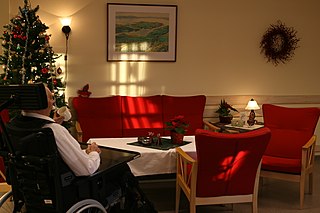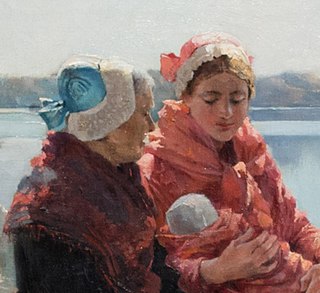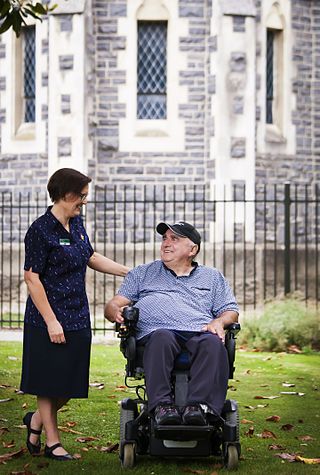Related Research Articles

Grief is the response to the loss of something deemed important, particularly to the loss of someone or some living thing that has died, to which a bond or affection was formed. Although conventionally focused on the emotional response to loss, grief also has physical, cognitive, behavioral, social, cultural, spiritual and philosophical dimensions. While the terms are often used interchangeably, bereavement refers to the state of loss, while grief is the reaction to that loss.
An extended family is a family that extends beyond the nuclear family of parents and their children to include aunts, uncles, grandparents, cousins or other relatives, all living nearby or in the same household. Particular forms include the stem and joint families.

A sibling is a relative that shares at least one parent with the other person. A male sibling is a brother, and a female sibling is a sister. A person with no siblings is an only child.

Geriatrics, or geriatric medicine, is a medical specialty focused on providing care for the unique health needs of the elderly. The term geriatrics originates from the Greek γέρων geron meaning "old man", and ιατρός iatros meaning "healer". It aims to promote health by preventing, diagnosing and treating disease in older adults. There is no defined age at which patients may be under the care of a geriatrician, or geriatric physician, a physician who specializes in the care of older people. Rather, this decision is guided by individual patient need and the caregiving structures available to them. This care may benefit those who are managing multiple chronic conditions or experiencing significant age-related complications that threaten quality of daily life. Geriatric care may be indicated if caregiving responsibilities become increasingly stressful or medically complex for family and caregivers to manage independently.
Elder abuse is a single or repeated act, or lack of appropriate action, occurring within any relationship where there is an expectation of trust, which causes harm or distress to an older person. This definition has been adopted by the World Health Organization (WHO) from a definition put forward by Hourglass in the UK. Laws protecting the elderly from abuse are similar to and related to laws protecting dependent adults from abuse.

Elderly care, or simply eldercare, serves the needs of old adults. It encompasses assisted living, adult daycare, long-term care, nursing homes, hospice care, and home care.
A person's next of kin (NOK) may be that person's spouse, adopted family member or closest living blood relative. Some countries, such as the United States, have a legal definition of "next of kin". In other countries, such as the United Kingdom, "next of kin" may have no legal definition and may not necessarily refer to blood relatives at all.
Undue influence (UI) is a psychological process by which a person's free will and judgement is supplanted by that of another. It is a legal term and the strict definition varies by jurisdiction. Generally speaking, it is a means by which a person gains control over their victims' decision making through manipulation tactics and unfair pressure, typically for financial gain. Historically, UI has been poorly understood, even in some legal circles.

A retirement community is a residential community or housing complex designed for older adults who are generally able to care for themselves. Assistance from home care agencies is allowed in some communities, and activities and socialization opportunities are often provided. Some of the characteristics typically are: the community must be age-restricted or age-qualified, residents must be partially or fully retired, and the community offers shared services or amenities.
Kinship care is a term used in the United States and Great Britain for the raising of children by grandparents, other extended family members, and unrelated adults with whom they have a close family-like relationship such as godparents and close family friends because biological parents are unable to do so for whatever reason. Legal custody of a child may or may not be involved, and the child may be related by blood, marriage, or adoption. This arrangement is also known as "kincare" or "relative care." Kinship placement may reduce the number of home placements children experience; allow children to maintain connections to communities, schools, and family members; and increase the likelihood of eventual reunification with birth parents. It is less costly to taxpayers than formal foster care and keeps many children out of the foster care system. "Grandfamily" is a recently coined term in the United States that refers to families engaged in kinship care.

The sandwich generation is a group of middle-aged adults who care for both their aging parents and their own children. It is not a specific generation or cohort in the sense of the Greatest Generation or the Baby boomer generation, but a phenomenon that can affect anyone whose parents and children need support at the same time.

A caregiver, carer or support worker is a paid or unpaid person who helps an individual with activities of daily living. Caregivers who are members of a care recipient's family or social network, and who may have no specific professional training, are often described as informal caregivers. Caregivers most commonly assist with impairments related to old age, disability, a disease, or a mental disorder.

Family is a group of people related either by consanguinity or affinity. It forms the basis for social order. Ideally, families offer predictability, structure, and safety as members mature and learn to participate in the community. Historically, most human societies use family as the primary purpose of attachment, nurturance, and socialization.
Social organization in Cambodia is very hierarchical. The greater a person's age, the greater the level of respect that must be granted to them. Everyone in Khmer culture is given a hierarchical title before the name - in some cases names are shortened with the title added before the name is given - which varies in relation to the person.

The United States federal earned income tax credit or earned income credit is a refundable tax credit for low- to moderate-income working individuals and couples, particularly those with children. The amount of EITC benefit depends on a recipient's income and number of children. Low-income adults with no children are eligible. For a person or couple to claim one or more persons as their qualifying child, requirements such as relationship, age, and shared residency must be met.
Grey divorce is the demographic trend of an increasing divorce rate for older ("grey-haired") couples in long-lasting marriages, a term typically used for people over 50. Those who divorce may be called silver splitters. Divorcing late in life can cause financial difficulties.
A vulnerable adult is an adult who, due to mental or bodily disability, cannot take care of themselves without help from others.
For many elderly carers of a relative who has a learning or other disability, future planning is an issue. The population of older parents who have children with a learning disability is growing and many of their children are likely to outlive them. In many cases the caring role can span up to seven decades, ending only with their death. Governments and other service providers cannot ignore the pressing needs of this population and their parent and sibling carers. In most countries, family carers provide inexpensive care for a person with a learning disability and other disabilities. This trend is set to continue in England. Demographic changes and the health needs of these two growing populations must be considered against government policy constraints and limited in-home and external care options in order to avoid a crisis. The consequences of not supporting these family carers will lead to crisis management, increase in distress and care giving burdens, and increased spending on unsuitable crisis placements. Housing and financial guidance are issues for caregivers.
Caregiving by country is the regional variation of caregiving practices as distinguished among countries.
Elder financial abuse is a type of elder abuse in which misappropriation of financial resources or abusive use of financial control, in the context of a relationship where there is an expectation of trust, causes harm to an older person.
References
- 1 2 3 4 5 6 7 Span, Paula (2022-12-03). "Who Will Care for 'Kinless' Seniors?". The New York Times. ISSN 0362-4331 . Retrieved 2022-12-06.
- 1 2 PhD, Roland J. Thorpe Jr; PhD, Jessica A. Kelley (2021-12-09). Annual Review of Gerontology and Geriatrics, Volume 41, 2021: Black Older Adults in the Era of Black Lives Matter. Springer Publishing Company. p. 126. ISBN 978-0-8261-6632-6.
- ↑ "When Elder Care Is All in the Stepfamily".